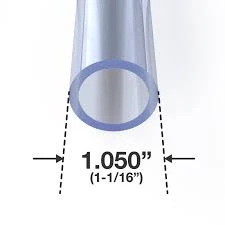Nov . 27, 2024 15:45 Back to list
Choosing the Right PVC Drain Pipe for Your Plumbing Needs
Understanding PVC Drain Pipes A Comprehensive Overview
When it comes to plumbing and drainage solutions, PVC drain pipes have emerged as one of the most popular choices for both residential and commercial applications. PVC, or polyvinyl chloride, is a type of plastic that is widely used due to its versatility, durability, and cost-effectiveness. In this article, we will delve into the various aspects of PVC drain pipes, their benefits, applications, and installation guidelines.
What is PVC?
Polyvinyl chloride is a synthetic plastic polymer that is used in a variety of construction materials, from window frames to flooring. It is particularly favored in plumbing for its resistance to corrosion and chemicals, making it suitable for various types of drainage systems. PVC is lightweight, making it easy to transport and handle during installation, which is a significant advantage over traditional materials like cast iron or concrete.
Benefits of PVC Drain Pipes
1. Durability One of the most significant advantages of PVC drain pipes is their durability. These pipes do not rust, corrode, or degrade over time, even when exposed to various environmental factors, making them a long-lasting choice for drainage systems.
2. Chemical Resistance PVC is resistant to a wide range of chemicals, which means it can effectively handle waste and effluents from a variety of sources without deteriorating.
3. Ease of Installation The lightweight nature of PVC allows for easy handling and quicker installation processes. This can translate to lower labor costs and faster completion times for plumbing projects.
4. Cost-Effectiveness PVC pipes are often more affordable than their metal counterparts. The lower cost, coupled with reduced installation times, makes PVC a cost-effective plumbing solution.
5. Smooth Interior Walls The inner surface of PVC pipes is smooth, which reduces friction and allows for efficient flow of water and waste. This helps prevent clogs and ensures a reliable drainage system.
6. Versatility PVC drain pipes can be used in various applications, including residential plumbing, commercial systems, and industrial settings. They are available in a range of sizes and configurations to suit different needs.
Applications of PVC Drain Pipes
PVC drain pipes are utilized in numerous settings and for various purposes
. Common applications includepvc drain pipe

- Residential Drainage Systems Homeowners commonly use PVC pipes for sink, kitchen, and bathroom drainage. Their resistance to corrosion makes them ideal for handling wastewater without breaking down.
- Stormwater Management PVC pipes are often used in surface drainage systems to manage stormwater runoff, helping to prevent flooding and erosion.
- Sewage Systems In many municipalities, PVC pipes are used for sewer lines due to their strength and ability to resist punctures, as well as their long lifespan.
- Irrigation Agricultural applications frequently employ PVC pipes for irrigation systems, taking advantage of their lightweight structure and resistance to chemicals commonly found in fertilizers and pesticides.
Installation Guidelines
Installing PVC drain pipes is relatively straightforward, but certain guidelines should be followed for optimal performance
1. Cutting the Pipe When cutting PVC pipes, ensure that the cut is straight to maintain a proper seal when joining sections together.
2. Using the Right Fittings Various fittings are available for PVC pipes, including elbows, tees, and couplings. Use the appropriate fittings to ensure a secure and leak-free connection.
3. Priming and Gluing Before joining sections, apply PVC primer to soften the surface and ensure a thorough bond. After priming, use PVC cement to secure the joint.
4. Maintaining Correct Slopes For drainage pipes, it is crucial to maintain a consistent slope away from the source to facilitate proper drainage.
5. Preventing Damage Avoid exposing PVC pipes to extreme temperatures or direct sunlight for prolonged periods, as this can lead to warping or weakening.
Conclusion
PVC drain pipes are an essential component of modern plumbing systems, offering a range of benefits that contribute to their widespread use. Their durability, chemical resistance, and cost-effectiveness make them an excellent choice for a variety of applications. With proper installation and care, PVC drain pipes can provide reliable service for many years, proving to be a smart investment for any plumbing project. Whether you are a homeowner, contractor, or DIY enthusiast, understanding the advantages and applications of PVC drain pipes will equip you with the knowledge needed to harness their potential effectively.
-
High-Quality PPR Pipes and Fittings Durable ERA PPR & PVC PPR Solutions
NewsJul.08,2025
-
Black HDPE Cutting Board - Durable, Non-Porous & Food Safe HDPE Plastic Cutting Board
NewsJul.08,2025
-
High-Quality CPVC Panel Durable HDPE & PVC Panels Supplier
NewsJul.08,2025
-
Double PE Welding Rod Supplier - High Strength, Durable & Versatile Welding Solutions
NewsJul.07,2025
-
High-Quality PVC-O Pipe Supplier Durable 75mm PVC Pipe & Connections Leading PVC Pipe Company
NewsJul.07,2025
-
HDPE Drainage Pipe Supplier – Durable & Corrosion-Resistant Solutions
NewsJul.06,2025

